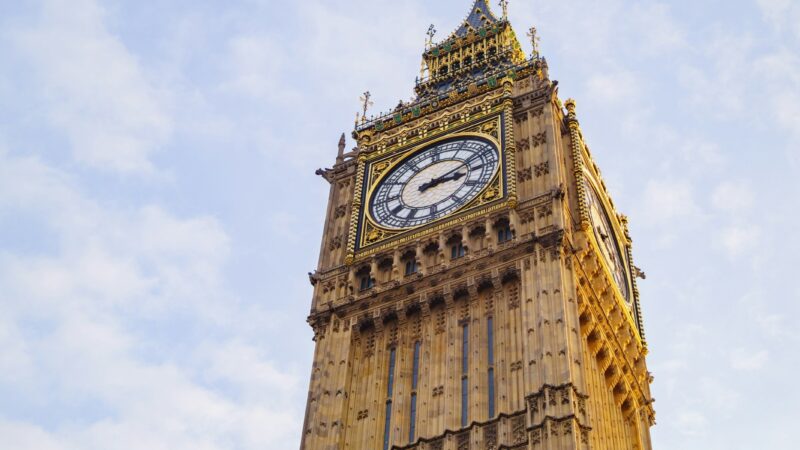Time To Stop Being Conservatives
‘Conservative’, big and small ‘c’, is blah. Blah party, policies, politicians, polls, prospects, and that’s just the ‘p’ words.
Let’s deal with ‘party’ first. Perhaps you’ve already stopped being a Conservative. There’s plenty of debate among the duckies about leaving, destroying, destroying and rebuilding, long marching through, etc. the Conservative Party. Whatever, sure, broadly, one way or another, there should be a proper political force which reflects ducky views. More on this later.
The real question is this: should you even be a conservative, let alone a Conservative, any more? What is the virtue of being a ‘conservative’? It’s a small tactical mistake, with large consequences, but easily tweaked and fixed. The Conservative Party may present itself as conservative and full of people who are not. How has that worked out?
Policies. What on a practical political level has ‘being a (C/c)onservative’ got you for the last decade, or more? What is it getting you now? What does it look like it’s going to get you in the next decade…or more?
Politicians. Ultimately, it’s these guys to blame for the blah policies. It shouldn’t be any surprise that the Conservative Party has blah policies though. Just look at its politicians. I’ve written at length (see the May 2022 magazine) about how, basically, the Conservative Party doesn’t select for competence, it selects for loyalty, and how changing its composition is unrealistic. You’re just going to have to be stuck with a ministerial cadre which belly flops, marries pensioners, plays hide and seek, and gobbles knobs for public entertainment. Is it even accurate to say that these people present as ‘conservative’ while failing to govern as conservatives? In any case, why are you surprised that they’re failures, and why would you care to keep associating with them? It’s time to stop being conservatives.
Polls. When the presentation of ‘conservative’ is so beyond saving, all that’s left is the reverse. Be conservative, act conservative, but don’t care to present as a conservative. Keep all the principles, attract the people who have them, those who like to pretend they don’t because it’s not fashionable, and those who are merely superficially put off. It costs you nothing but, what, comfiness, pride, what? To ditch a label which gets you nothing practically or aesthetically?
Jake Scott is right. Conservatives aren’t cool. Isn’t it incredibly telling that I’m by far the coolest person he knows and I’m not a conservative? It’s why I’m telling you not to be too. It’s not just the young fogeys, Thatcher throbbers, port & policy chortlers, MP-selfie-profile-pictures – does that cover it? – it’s the concept itself.
Prospects. Alright, this is a bit flimsy, and I’m done with this ‘p’ gimmick. ‘Conservative’ keep you trapped in a progressive paradigm, limiting your prospects. You are conservative relative to their progress. Sure, they’re progressive relative to what you want to conserve, but is that really how it’s taken in the zeitgeist? It doesn’t work the other way around. ‘Conservative’ doesn’t sound like you want to keep what’s what. It sounds like there’s one of two broad choices you can be, left/right, Conservative/Labour. What is it to present as the ones who just want to stick where you are and do nothing? “But there’s plenty I want to build and fix and do to make the UK excellent”, you say. Good! I hear you. In fact, a line from The Mallard’s own Wednesday Addams in her review of Peter Hitchens’ new book stood out to me. “He mourns not for a pristine past, but a future that never was”. Does the word, name, presentation, etc. of ‘(C/c)onservative’ ever connote that idea too? Would anyone associate the word or concept of the future with ‘(C/c)onservatives’ on Family Fortune? Whatever, this is a small tweak too.
Don’t just mourn, don’t be one of those people who seem to enjoy self-pity, wallowing in the ‘man among the ruins’ thing. Even if it’s not so negative, don’t just be twee, oh the green and pleasant land, God save the King, blah. Find and keep what’s valuable, think about how to conserve it, but also how to bring it into the future. While you’re at it, adjust your attitude toward the future. Hitchens is an old man, so whatever, maybe it’s forgivable that all he can do is mourn for a future that never was. But you can act for a future that will be. It will. And you have to totally unironically, unreservedly believe that. Make it a matter of truth!
Jake Scott is right again. Stop pretending as if you are living in a liberal pluralist society in which different ideologies are just different options in a marketplace. I’m not sure this is quite what he meant, but it’s my take: some ways of doing things are better than others. Whether that’s economic, educational, social, whatever. There are better and worse ways of running a country. The progressives are objectively shit.
Truth. You are not a conservative, you are not right wing, even, you just believe in the truth. Twitter has been in the news, let’s use that as an example. The now dismal, disgraced, and now discarded Vijaya Gadde, could not even begin to conceive that Twitter had biased rules against conservatives on defining ‘misgendering’. It’s because her opinion wasn’t just an opinion. It was the truth. Of course, she was wrong. You are the ones with the truth. This is going to get tiresome referring to the same Jake Scott video, but he is right again. If anything he isn’t radical enough. On some things there just is no battle of ideas. There is no debate on insanity. Not in the real world, at least, maybe stuffed away in university philosophy departments where the debate can keep going for 3,000 years without resolution and not interfere with anything that matters.
Anyway, the truth is also that broadly conservative ideas about a whole range of topics are held by most of the country. Brexit was the big one, already proven. Next could be anything from immigration to British values, house building, tax, or all of them if only there was a proper political force prepared to go for it. More on that right at the end. In the meantime, what you believe is true and it will come to be, because you are going to make it happen.
This article hasn’t come out of nowhere, exactly. There does seem to be some buzz around the idea of ‘sensible centrists’. Is that the right branding? Not sure about it, but the concept is onto something which is good politics.
TL;DW, examples from the linked video: 1) it’s extreme to import hundreds of thousands of people to the country, the sensible position is to set immigration by what the country needs, 2) it’s extreme to let crime go rampant and obsess over the relatively small problem of one or two racist police, the sensible position is to be tough on crime, or 3) it’s extreme to hire thousands of people to obsess over a small number of people getting offended, to the tune of billions, rather than just not cater to that hysterical timewasting minority.
It’s not an entirely new idea, but popularising it in ‘right-wing’ circles is valuable, and so is the formula, which is new. The proof that it’s good is that it has been done before. How far back do you want to go? Curtis Yarvin presents Caesar as an imperially purple (red/blue/Republican/Democrat) end to chaotic fighting between extremes – a sensible centre. More recently Vote Leave presented the ‘leave’ option as a sensible left and right-backed, cross-party, non-UKIP, sensible centre which was merely taking back control from an extreme EU, where actually remaining would be the less certain, more dangerous, crazy option.
Does the UK feel stable, well-governed, on the right and true path, today? Is the UK sensible or extreme? See the appendix below if you need any help. Everything is totally fucking awful. It doesn’t even have to be! It could just be well governed instead. You’re not a conservative, you just want a good government.
Today, it is governed by Conservatives. It has been backed by conservatives or otherwise simply just not replaced by conservatives, and in any case conservatives have been totally contaminated by the idea of Conservatives. On top of all of this, when you have the truth on your side, what is there even to be gained by being (C/c)onservatives? Again, see the appendix below for some sense of the scale of the problem.
I’m not sure what exactly is next. Rallying around any sort of name or group or identity, especially if it isn’t totally solid and ready, presents a target. For now it’s enough to simply reject the idea that you are a conservative, or right-wing, especially when asked or characterised as such.









On Science and Conservatism: Is the Relationship Dead?
Why have conservatives have turned against science? This question is a fundamental mischaracterisation of the relationship between science and right-wing thinkers. As a young scientist and a conservative, I find myself straddling this so-called divide and in the unique position to offer analysis on the state of the relationship between the right-wing and science. It is true that today, with issues such as climate change and vaccine efficacy, right-wing criticisms of the scientific elite have overwhelmingly dominated the discourse on scientific distrust. But if one is to truly interrogate the disconnect between modern day conservatism and the scientific mainstream, you must also consider the converse; why has science turned against right-wing thought? Or perhaps more notably, how have left-wing idealogues used science against conservatives?
The left-wing bias of modern academia is well documented, with one recent study published by Nature revealing that only six percent of researchers self-identify as conservative and less than ten percent of academic political donations support conservative candidates. With this troubling trend of progressive overrepresentation in scientific circles, the left has used their advantage to co-opt and manipulate science for its own political ends. This threatens to undermine the very principles of intellectual freedom and academic integrity upon which scientific inquiry depends.
With the left having such a hold over modern science, the tendency on the right has, somewhat justifiably, been outright rejection of scientific thought and practice. This seems a self-defeating proposition. Sustainable prosperity will only be practically achievable if we look to make technological progress within our own borders. To do this we must address some major flaws which have become inherent to scientific thinking, causing both alienation of conservative thinkers and degeneration of the scientific practice.
Suppression of Dissent
Central to the ethos of scientific inquiry is the freedom to question the prevailing orthodoxy and challenge established thought. Yet, in recent years, the left has sought to suppress dissenting voices and enforce ideological conformity within the scientific community. This manifests itself in two ways, firstly through the development of a culture within academic institutions which is antithetical to conservative viewpoints and, perhaps more importantly, through political discrimination in grants and publication, prohibiting conservative viewpoints from being spread in scientific literature.
An often-understated consequence of the leftward shift in academia is the comprising impact on peer-review. Peer-review is the process which underpins science. Academics review the work of other researchers to assess the scientific validity and rigour of their experimentation and argument before the work can be published. Whilst a noble concept, it is easily victim to confirmation bias. If only six percent of academics identify as conservative, how likely is it that the handful of reviewers of a grant proposal or paper will be ideologically conservative or even supportive of controversial proposals? This fear is not merely the musings of a scorned conservative scientist but a reality backed up by research. Half of academics would mark down a right-wing grant application. Four in ten American academics admit they wouldn’t hire a Trump supporter. A third of British academics would not hire a Brexiter. Not only does this inhibit the volume of conservative scientific literature, but it restricts a conservative’s earning capacity from grants and promotion, and therefore their academic influence. What this leads to is the self-censorship of conservative thinkers looking to progress their careers, thus creating a spiral of worsening conservative intolerance on campuses and in academia.
One striking example of this phenomenon is the case of postdoctoral researcher, Dr Noah Carl. Dr Carl graduated from the prestigious University of Oxford with a thesis titled ‘Cognitive ability and sociopolitical beliefs and attitudes’ and was subsequently awarded the Toby Jackman Newtown Research Fellowship at St Edmund’s College in Cambridge. For early-career researchers, such a postdoctoral fellowship is invaluable in gaining a foothold in the cut-throat academic industry. Yet Dr Carl was never able to assume his position as he was dismissed by St Edmund’s College for his alleged association with far-right figures. This so-called association involved attending a conference also attended by race researchers and publishing in a journal with a controversial editor. He advocated for free inquiry into how stifling debates around race can do harm and his research examined common stereotypes. Even a cursory assessment of this reasoning shows how Dr Carl was only guilty of challenging the left-wing orthodoxy. The University had no issue with his research when they appointed him, but guilt by association was sufficient to effectively end a young researcher’s career after left-wing student backlash.
Another case is that of esteemed Professor of Public Law at Macquarie University in Sydney, Andrew Fraser, who published a letter in 2005 in his local newspaper calling for restriction of African immigration, due to its effect on increasing crime rates. Macquarie University initially defended Fraser’s right to free speech, but after pressure from the local Sudanese community, Fraser was suspended, with the University citing how Fraser had affected the university’s ability to operate and offering a public apology to those who were offended. Again, absent from the response was any criticism of Fraser’s scientific rigour. Fraser has long been a proponent of the role of immigration in increasing Australian crime rates, the evidence for which remains strong to this day.
Regardless of your own views on these issues, its inarguable that both scholars faced vilification and professional repercussions for conducting research and providing comment which deviated from the left’s ideological agenda. The cancellation of scholars like Carl and Fraser serves as a chilling reminder of the dangers of ideological conformity in scientific discourse. By stifling dissent and enforcing orthodoxy, the left undermines the very foundation of scientific inquiry, to question and hypothesise, thus relegating it to a tool of political expediency rather than a genuine quest of understanding.
The Rise of Scientism
Perhaps the most insidious aspect of the left’s control over science is the rise of scientism,a quasi-religious belief in the infallibility of scientific authority. In the eyes of leftist ideologues, science has become not merely a tool for understanding the natural world, but an all-encompassing worldview that supplants religion and morality. There is no phrase I personally detest more than, ‘Trust the science.’ This phrase has become a mantra of progressive politicians, but it betrays a fundamental misunderstanding of scientific practice. In trying to project science as objective truth, they are committing a major offence of scientific thought, presenting a theory as fact. The scientific method is built around making hypotheses and proving them wrong based on observation and evidence. Anyone that tells you science can prove truth is lying to you. It is fundamentally impossible to prove truth by using the scientific method, as more evidence can always be uncovered to refute any such assertion. In the leftist zeal to elevate science to the status of an objective truth, they conflate empirical evidence with ideological principles, compromising the integrity of the scientific process.
Science was never intended to replace religion or morality but rather to complement and enhance our understanding of the world. Renowned scientist Isaac Newton, for instance, integrated his Christian faith into his exploration of natural laws, aiming to inspire others to appreciate the beauty of divine creation.
Modern scientists are increasingly unravelling new frontiers, from artificial intelligence to genetic modification, prompting profound ethical questions. But unfortunately, as science has progressed, secularism and scientism have gained traction in intellectual circles, causing the influence of religion on scientific discourse to wane. This trend has left a moral vacuum within the scientific community at a time when it is most needed. As we look to address the ethical questions of new scientific frontiers, the increasingly fervent belief in the infallibility of science among the elite is a dangerous precedent to set in our quest for knowledge.
How do we fix it?
It was easy during the Covid-19 lockdowns to argue against science, as it was used to justify draconian government laws. But now this period has passed, such a trajectory is self-defeating. Countless right-wing figures have continued to prosecute against science, yet they largely remain excluded from serious political discourse. Clearly though, a total embrace of the scientific establishment ignores a long-standing hostility and prosecution of right-wing thought.
As we look to wrest control over our own countries back from the leftist elite, conservatives and nationalists ignore science at their own peril. Across the Anglosphere we see conservative parties stagnating. Young people are disengaging from politics. Idealogues are pursuing their agendas. If a truly right-wing presence is going to be felt in politics it must champion cultural revival, national progress, and self-reliance. By leveraging national resources and driving scientific and technological innovation, we can build a future focused economy to our own benefit. Importantly, science can be reclaimed from leftist control by promoting independent domestic research to replace our current bureaucratic institutions, prioritising the protection of conservative thought in academia and rebuilding confidence among the right-wing populace.
So, is the relationship between conservatives and science dead? From suppressing dissenting voices to the promotion of quasi-religious faith in scientific infallibility, the left’s agenda threatens to degenerate scientific practice and undermine its capacity to investigate the world around us. But this should not catalyse right wing rejection of science. Science may have turned its back on right-wing intellectuals, but in a constantly evolving world it would be counterproductive for conservatives to concede science to the Left. It’s only with the input of conservative thinkers that truly free scientific endeavour can help lead us away from regression and embrace a vision for right-wing progress.
Photo Credit.